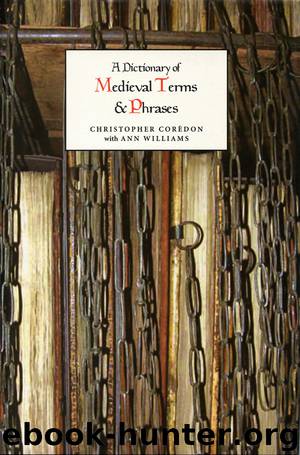A Dictionary of Medieval Terms and Phrases by Christopher Corèdon

Author:Christopher Corèdon
Language: eng
Format: epub
ISBN: 9781782042525
Publisher: Boydell & Brewer Group Ltd
Published: 2013-11-22T16:00:00+00:00
I
Icknield Way. Prehistoric track which connected the Wash with Salisbury Plain. The meaning of ‘Icknield’ is unknown.
Ictus regis. Lit. ‘king’s strike or blow’. The formal exchange of blows at the beginning of a duel between individual combatants, e.g. *champion and challenger. – Cf. CRAVEN; DUELLUM
IHS. Iesus, hominum salvator = Jesus, saviour of mankind. These initials were often used in images and paintings of Christ.
Illumination. Term applied to the practice of applying gold and silver to initial letters in MSS in this period. The term is now used to include colours, often red, but strictly should refer only to gold and silver. – Cf. RUBRIC
Immixtio manuum. Lit. ‘mixing of hands’. During the ceremony of *homage, the *vassal placed his hands between those of his lord; this was followed by the oath of *fealty.
Impale. Her. Term used when two coats of arms were displayed on the same shield, separated by a vertical line (*pale). When a woman’s family’s arms were impaled upon those of her husband they were placed on the *sinister side. Arms which were not impaled indicated they were those of an unmarried man. – Cf. ARMS, COAT OF
Impeachment. Form of criminal trial which emerged in the 14c, falling from use after the mid-15c. Such trials were begun in the House of Commons with the lords serving as judges. [< OFr. empecher < L impedico = to catch]
In capite. Lit. ‘in *chief’. Latin term indicating land was held ‘in *chief’ of the king, as a *tenant-in-chief would.
In chief. Phrase used of land held directly of the king. Such lords and magnates were known as ‘tenants-in-chief’. The Latin = in capite.
In commendam. Lit. ‘in trust’. Latin phrase used when a *benefice was given to a layman temporarily until a permanent appointee could be found. [< L commendo = to deposit, to entrust]
In curiam. See IN PECUNIA
In denario. See IN PECUNIA
In domus. See IN PECUNIA
In paragio. Lit. ‘in line’. Joint tenure of an estate through inheritance; or, tenure between *parceners. This form of tenure ensured an estate’s unity, the senior partner being responsible for all estate obligations. The English form is ‘parage’.
In pecunia. Lit. ‘in money’. Phrase used in account books for a sum paid in coin, rather than in kind, e.g. grain, eggs, honey. In denarii was also used of payments in cash; in argento was used when silver coins were proffered; in auro for payment in gold. For a payment made in the *manorial court, in curia was used; in the house, in domo; in the *exchequer of a large establishment, in scaccario; in aratro was used if the collector found the payer at the plough.
In scaccario. See IN PECUNIA
In use. See ENFEOFFMENT TO USE
Inblanch. Term used of payments made in assayed coin, rather than in goods or produce. – Cf. ALBA FIRMA; BLANCH FARM
Incensed. Her. Angry (of an animal), with fire bursting from mouth and eyes.
Incipit. Lit. ‘it begins, here begins’. MSS lacked title pages as we know them; instead the texts they contained were referred to by their opening words or words in lists or catalogues of books.
Download
This site does not store any files on its server. We only index and link to content provided by other sites. Please contact the content providers to delete copyright contents if any and email us, we'll remove relevant links or contents immediately.
Cecilia; Or, Memoirs of an Heiress — Volume 1 by Fanny Burney(32548)
Cecilia; Or, Memoirs of an Heiress — Volume 2 by Fanny Burney(31947)
Cecilia; Or, Memoirs of an Heiress — Volume 3 by Fanny Burney(31932)
The Lost Art of Listening by Michael P. Nichols(7494)
Asking the Right Questions: A Guide to Critical Thinking by M. Neil Browne & Stuart M. Keeley(5759)
We Need to Talk by Celeste Headlee(5608)
On Writing A Memoir of the Craft by Stephen King(4935)
Dialogue by Robert McKee(4389)
Pre-Suasion: A Revolutionary Way to Influence and Persuade by Robert Cialdini(4224)
I Have Something to Say: Mastering the Art of Public Speaking in an Age of Disconnection by John Bowe(3874)
Elements of Style 2017 by Richard De A'Morelli(3343)
The Book of Human Emotions by Tiffany Watt Smith(3303)
Fluent Forever: How to Learn Any Language Fast and Never Forget It by Gabriel Wyner(3079)
Name Book, The: Over 10,000 Names--Their Meanings, Origins, and Spiritual Significance by Astoria Dorothy(2979)
Good Humor, Bad Taste: A Sociology of the Joke by Kuipers Giselinde(2945)
Why I Write by George Orwell(2945)
The Art Of Deception by Kevin Mitnick(2796)
The Grammaring Guide to English Grammar with Exercises by Péter Simon(2740)
Ancient Worlds by Michael Scott(2682)
